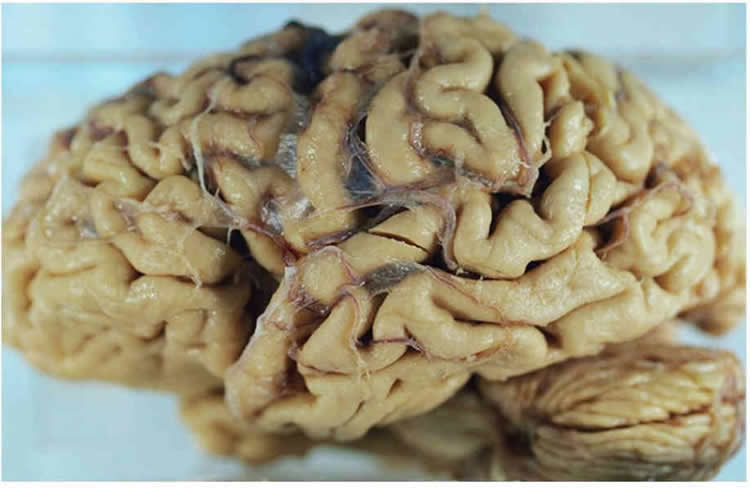Mount Sinai Researchers Identify Brain Insulin Resistance as Possible New Link Between Alzheimer’s Disease and Diabetes.
Several epidemiological studies support the hypothesis that diabetes increases a person’s risk for developing Alzheimer’s disease.
However, new research from the Icahn School of Medicine at Mount Sinai published in the journal Alzheimer’s and Dementia suggests the reverse—that Alzheimer’s disease (AD) impairs insulin signaling in the portion of the brain responsible for regulating metabolism, making a person with AD more likely to develop diabetes. Findings also indicate that an increase of a particular group of amino acids in the blood could serve as a biomarker of impaired brain insulin signaling.
The study, conducted in mice, is part of ongoing research funded by the National Institutes of Health (NIH) to better understand the link between AD and diabetes. It is the first study to show that mice with AD have insulin resistance (a precursor to type II diabetes) in the hypothalamus, the area of the brain that regulates metabolism of nutrients such as fatty acids, glucose, and amino acids in tissues including muscle, liver, and fat. The mice with AD also showed elevated levels of branched chain amino acids (BCAA) in the blood. A previous study from the same team of researchers had demonstrated that brain insulin signaling regulates BCAA levels in blood, and hence BCAAs could be a novel biomarker of hypothalamic insulin action in patients with Alzheimer’s, which still needs to be confirmed in humans.
“This is the first study to suggest that Alzheimer’s disease pathology increases susceptibility to diabetes due to impaired insulin signaling in the hypothalamus,” said Christoph Buettner, MD, PhD, Associate Professor of Medicine, Endocrinology, Diabetes, Bone Disease and Neuroscience, Icahn School of Medicine at Mount Sinai, and lead author of the study. “Our research provides a rationale that therapies developed to improve insulin signaling in the brain may reduce the likelihood that a patient with Alzheimer’s disease develops diabetes.”
Alzheimer’s disease is a progressive and fatal brain disorder that gradually destroys a person’s memory and ability to learn, reason, make judgments, communicate, and carry out daily activities. AD is the most common form of dementia and sixth leading cause of death in the United States. Diabetes, the seventh leading cause of death nationally, is a metabolic disease that results in high blood sugar levels because the body does not produce enough insulin for proper function. Aging is known to be one of the top risk factors for both diseases, and several previous epidemiological studies have supported the hypothesis that diabetes increases a person’s risk for AD.

“Our findings represent a turning point in the understanding of the relationship between Alzheimer’s disease, type II diabetes and insulin resistance,” said Sam Gandy, MD, PhD, Professor of Neurology and Psychiatry; Associate Director, Mount Sinai Alzheimer’s Disease Research Center; and co-author of the study. “Compelling and unexpected results such as Dr. Buettner’s are driving a complete re-evaluation of how these diseases interact. Now that we have disease genes for dementia and diabetes, those genes are our ground zero, and the challenge is to work out all the steps and missteps between the gene and the patient and then to find interventions that cure those missteps.”
Henry Ruiz, PhD, a postdoctoral fellow in the Buettner lab, Icahn School of Medicine at Mount Sinai, also collaborated in the study.
Funding: The study was supported by the National Institute on Aging (NIA), one of the 27 Institutes and Centers of the National Institutes of Health (NIH), and the American Diabetes Association (ADA).
Source: Sasha Walek – Mount Sinai Health System
Image Credit: The image is in the public domain.
Original Research: Abstract for “Increased susceptibility to metabolic dysregulation in a mouse model of Alzheimer’s disease is associated with impaired hypothalamic insulin signaling and elevated BCAA levels” by Henry H. Ruiz, Tiffany Chi, Andrew C. Shin, Claudia Lindtner, Wilson Hsieh, Michelle Ehrlich, Sam Gandy, and Christoph Buettner in Alzheimer’s and Dementia. Published online February 26 2016 doi:10.1016/j.jalz.2016.01.008
Abstract
Increased susceptibility to metabolic dysregulation in a mouse model of Alzheimer’s disease is associated with impaired hypothalamic insulin signaling and elevated BCAA levels
Introduction
Epidemiologic studies have demonstrated an association between diabetes and dementia. Insulin signaling within the brain, in particular within the hypothalamus regulates carbohydrate, lipid, and branched chain amino acid (BCAA) metabolism in peripheral organs such as the liver and adipose tissue. We hypothesized that cerebral amyloidosis impairs central nervous system control of metabolism through disruption of insulin signaling in the hypothalamus, which dysregulates glucose and BCAA homeostasis resulting in increased susceptibility to diabetes.
Methods
We examined whether APP/PS1 mice exhibit increased susceptibility to aging or high-fat diet (HFD)-induced metabolic impairment using metabolic phenotyping and insulin-signaling studies.
Results
APP/PS1 mice were more susceptible to high-fat feeding and aging-induced metabolic dysregulation including disrupted BCAA homeostasis and exhibited impaired hypothalamic insulin signaling.
Discussion
Our data suggest that AD pathology increases susceptibility to diabetes due to impaired hypothalamic insulin signaling, and that plasma BCAA levels could serve as a biomarker of hypothalamic insulin action in patients with AD.
“Increased susceptibility to metabolic dysregulation in a mouse model of Alzheimer’s disease is associated with impaired hypothalamic insulin signaling and elevated BCAA levels” by Henry H. Ruiz, Tiffany Chi, Andrew C. Shin, Claudia Lindtner, Wilson Hsieh, Michelle Ehrlich, Sam Gandy, and Christoph Buettner in Alzheimer’s and Dementia. Published online February 26 2016 doi:10.1016/j.jalz.2016.01.008






